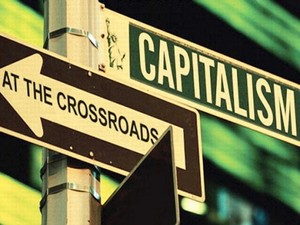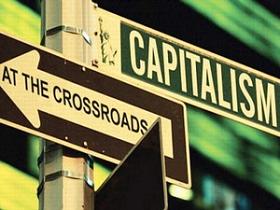Tight Media Control in Venezuela
Authoritarianism has not disappeared from the face of the earth and it will never -- but it has remained a salient feature of most rulers in the world who try to control the media to suppress the truth and news from reaching the voters.
The election for mayors and city councils in Venezuela was a dogfight in this deeply polarized country. It is also Maduro's first electoral test since he defeated Capriles in April by a razor-thin margin following Hugo Chavez's death from cancer.
The Maduro's regime in Venezuela, acing serous problems not wanting the media to embarrass the rulers, has brought the media under its tight control mechanisms. Mayoral elections including in Caracas are on their way and the regime is facing opposition from the voters.
Today Venezuelans endure their toughest economic crisis in 15 years of socialist rule, the opposition has been largely knocked from public view by what they claim is a government-led campaign to intimidate media outlets that give airtime to the opposition and the nation's mounting woes.
There's an economic crisis in Venezuela but paradoxically who has best capitalized on it politically is the government that generated it. The ruler has combined rhetoric with action and, just as importantly, has managed to sell a narrative of who are the ones to blame for the economic troubles. Media was the fittest tool in the hands of the regime to get votes.
Venezuela's economic problems are readily apparent in most supermarkets, where staples such as milk and toilet paper are harder to find and prices for other goods have skyrocketed in line with an official 54 percent inflation rate.
Facing a steady decline in the polls, Maduro on Nov. 9 seized control of several retail outlets, arrested dozens of store managers and slashed prices on plasma TVs and fridges to strike a blow against opponents he accuses of waging an "economic war" against his government. The measures have led to a steady improvement in the president's approval rating.
Visibly thinner and exhausted opposition leader Capriles warns that President Nicolas Maduro's attempts to silence the opposition signal a more authoritarian style of rule to come unless resoundingly reject his policies at the ballot box..
Last month government blocked access to dozens of websites used to track the black market value of the nation's currency, which has plunged to 10 times its official 6.3-per-dollar value.
While coverage of the opposition is being curtailed, Maduro is making greater use of the airwaves, the president has appeared on television an average of two hours a day. Opposition leader Capriles has been crisscrossing the country stumping for opposition candidates.
Last month the saga seemed to repeat itself when the editor of the country's main business newspaper, El Mundo, was fired after publishing an article on the hemorrhaging of the central bank's foreign currency reserves. Just a few weeks earlier, El Mundo's owner Cadena Capriles, the country's largest print media conglomerate, was purchased by a group of UK and Curacao-based investors. Cadena Capriles' founding owners aren't directly related to the politician who shares their last name.
Maduro in October publicly criticized newspaper Diario 2001 as "bandits" and called for it to be "punished" for publishing an article about gasoline shortages in Latin America's largest oil exporter. Within days of the tongue-lashing, federal prosecutors opened an investigation.
The most emblematic example of Venezuela's rougher media landscape is the takeover of TV station Globovision. When Chavez refused to renew the license of independent broadcaster RCTV in 2007, Globovision remained as the lone voice broadcasting criticism of the government. But after being fined $2 million last year for its coverage of the security forces' violent quelling of a prison riot, the channel was sold in May to three local businessmen with no prior media experience. Many veteran journalists were immediately fired or quit, and the channel overnight stopped broadcasting opposition news conferences and rallies.
The state is seen as being arrogant and aggressive to get the media to do regime work as their prime duty. The shrinking media coverage in Venezuela, imposed by the regime, has been deliberate. In order to make the journalists to speak for the regime with one voice, several attacks have been engineered cussing bloodshed in the media family. Between January and September, the number of attacks on journalists, cases of harassment and reports of censorship has risen 56 percent compared with the first nine months of 2012.
Upon terrorizing the journalists and warning the owners of the media outlets, the regime is forcing the sale of anti-regime and those outlets that do not cooperate with the m regime on coverage.
Even more damaging has been the sale of several media outlets once critical of the government to owners who more closely follow the official line.
The government is thus attempting with success in what is now called information blockade operations to keep the actual news from reaching the people and world at large.
The government denies it is threatening journalists or forcing its viewpoint, and attributes the decline in coverage of Capriles to the fact that voters and media bosses alike were turned off by his unsubstantiated claims of fraud following his defeat in the presidential race.
The opposition was hopeful that such hardships would allow it to build on most of the municipalities. The most likely result from Sunday's vote, is the opposition winning in Caracas and other big cities while the government remains dominant in the countryside, giving each side a claim on victory.
It seems the government media tactics could not actually persuade voters in all constituencies. maybe, the regime believed it is the only strategy to retrain the pro-regime vote banks.
Chavez's Socialist Party also made gains. The party's candidates held onto the state of Sucre, the central Caracas district of Libertador and the president's home state, Barinas, where his brother was elected governor.
The polls were regarded as a critical test for Chavez, whose allies until now controlled 21 states. The president said the outcome of the vote was an endorsement of Venezuela's "socialist project". "How can anyone say there is a dictatorship in Venezuela?
Results
Venezuela's President Hugo Chavez and allies have held on to 17 of the country's 22 governorships. The opposition won five states, including the two most populous, and won the mayoral election in Caracas. Results showed the opposition winning Miranda and holding onto Zulia, the two states with the largest electorates. The state of Nueva Esparta remained in opposition hands, while opposition candidates were also on course to win Tachira, which borders Colombia, and Carabobo, considered the industrial heartland of Venezuela. They also won mayoral elections in Caracas - formerly held by a Chavez supporter. The post is seen by some as the second most important job in the country.

د. عبد راف
-BY DR. ABDUL RUFF COLACHAL has been an educationist, Columnist-Commentator on world affairs Expert on Mideast Affairs, Chronicler of Foreign occupations & Freedom movements (Palestine, Kashmir, Iraq, Afghanistan, Pakistan, Xinjiang, Chechnya, etc.) Chancellor-Founder of Centor for International Affairs(CIA); Former university Teacher; Editor:INTERNATIONAL OPINION; FOREIGN POLICY ISSUES; Author of books;website: http://abdulruff.wordpress.com/ mail: abdulruff_jnu@yahoo.com/Phone: 91-8129081217---(Account: No 62310377429 - CIF No: 78215311481- State Bank of Hyderabad, India)
_____________________
Comments
There are 0 comments on this post













